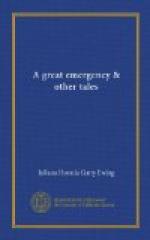“Take care of the pie,” said Fred.
It was a meat-pie which he had taken from the larder this morning; but he had told Mrs. Johnson about it in the letter he had left behind him; and had explained that we took it instead of the breakfast we should otherwise have eaten. We felt that earth-nuts might not be forthcoming on the canal banks, or even on the wharf at Nine Elms when we reached London.
At about a quarter to six Johnson’s wharf was quite deserted. The barge-master was having breakfast ashore, and the second man had gone to the stable. “We had better hide ourselves now,” I said. So we crept out and went on board. We had chosen our hiding-place before. Not in the cabin, of course, nor among the cargo, where something extra thrown in at the last moment might smother us if it did not lead to our discovery, but in the fore part of the boat, in a sort of well or hold, where odd things belonging to the barge itself were stowed away, and made sheltered nooks into which we could creep out of sight. Here we found a very convenient corner, and squatted down, with the pie at our feet, behind a hamper, a box, a coil of rope, a sack of hay, and a very large ball, crossed four ways with rope, and with a rope-tail, which puzzled me extremely.
“It’s like a giant tadpole,” I whispered to Fred.
“Don’t nudge me,” said Fred. “My pockets are full, and it hurts.”
My pockets were far from light. The money-bag was heavily laden with change—small in value but large in coin. The box of matches was with it and the knife. String, nails, my prayer-book, a pencil, some writing-paper, the handbook, and a more useful hammer than the one in my tool-box filled another pocket. Some gooseberries and a piece of cake were in my trousers, and I carried the tool-box in my hands. We each had a change of linen, tied up in a pocket-handkerchief. Fred would allow of nothing else. He said that when our jackets and trousers were worn out we must make new clothes out of an old sail.
Waiting is very dull work. After awhile, however, we heard voices, and the tramp of the horse, and then the barge-master and Mr. Johnson’s foreman and other men kept coming and going on deck, and for a quarter of an hour we had as many hairbreadth escapes of discovery as the captain himself could have had in the circumstances. At last somebody threw the barge-master a bag of something (fortunately soft) which he was leaving behind, and which he chucked on to the top of my head. Then the driver called to his horse, and the barge gave a jerk, which threw Fred on to the pie, and in a moment more we were gliding slowly and smoothly down the stream.
When we were fairly off we ventured to peep out a little, and stretch our cramped limbs. There was no one on board but the barge-master, and he was at the other end of the vessel, smoking and minding his rudder. The driver was walking on the towing-path by the old grey horse. The motion of the boat was so smooth that we seemed to be lying still whilst villages and orchards and green banks and osier-beds went slowly by, as though the world were coming to show itself to us, instead of our going out to see the world.




